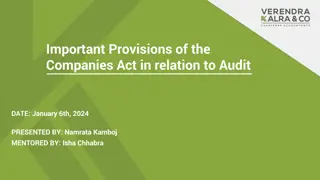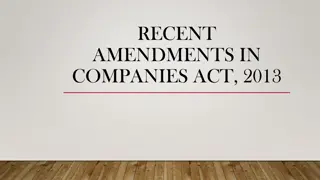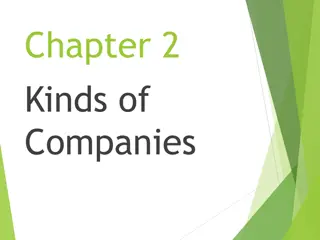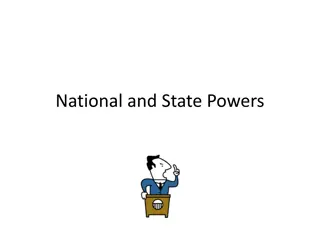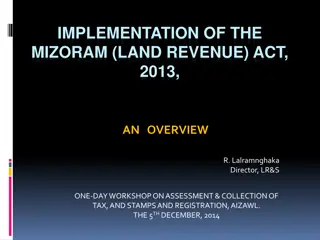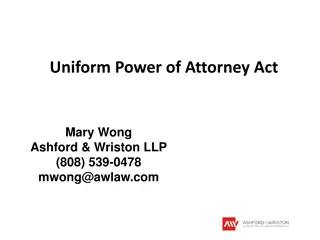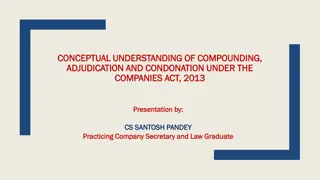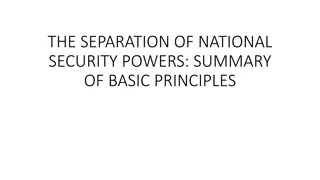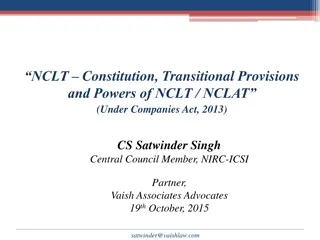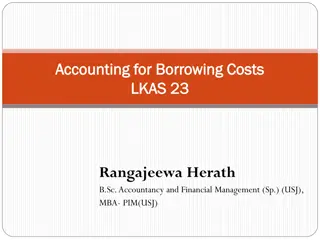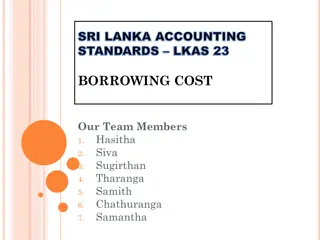Understanding Borrowing Powers of Companies under Companies Act, 2013
The term "Borrowing" in the Companies Act, 2013, pertains to the power granted in Section 180(1)(c) for companies to borrow money with the consent of the company by a special resolution. This includes provisions on limits, definitions of temporary loans, necessary board resolutions, and validity of debts. The section came into effect on 12th September 2013, impacting private and public companies. It emphasizes the need for shareholder approval for borrowing beyond the paid-up share capital and free reserves of the company.
Download Presentation

Please find below an Image/Link to download the presentation.
The content on the website is provided AS IS for your information and personal use only. It may not be sold, licensed, or shared on other websites without obtaining consent from the author. Download presentation by click this link. If you encounter any issues during the download, it is possible that the publisher has removed the file from their server.
E N D
Presentation Transcript
BORROWINGS Presented By: FCS Ashok Tyagi E-130, Greater Kailash 1, New Delhi E-Mail: atyagi53@gmail.com Mob: 09810070575
BORROWINGS The term Borrowing is not defined in Companies Act, 2013. BORROWING POWERS: Section 180(1)(c) of Companies Act, 2013 (corresponds to Section 293 of the Companies Act, 1956) Section 180 (1): - The Board of Directors of a company shall exercise the following powers only with the consent of the company by a special resolution, namely: (c) to borrow money, where the money to be borrowed, together with the money already borrowed by the company will exceed aggregate of its paid- up share capital and free reserves, apart from temporary loans obtained from the company s bankers in the ordinary course of business: Provided that the acceptance by a banking company, in the ordinary course of its business, of deposits of money from the public, repayable on demand or otherwise, and withdrawable by cheque, draft, order or otherwise, shall not be deemed to be a borrowing of monies by the banking company within the meaning of this clause.
Explanation: - For the purposes of this clause, the expression temporary loans means loans repayable on demand or within six months from the date of the loan such as short-term, cash credit arrangements, the discounting of bills and the issue of other short-term loans of a seasonal character, but does not include loans raised for the purpose of financial expenditure of a capital nature; Section 180(2) Every special resolution passed by the company in general meeting in relation to the exercise of the powers referred to in clause (c) of sub- section (1) shall specify the total amount up to which monies may be borrowed by the Board of Directors. Section 180(5) No debt incurred by the company in excess of the limit imposed by clause (c) of sub-section (1) shall be valid or effectual, unless the lender proves that he advanced the loan in good faith and without knowledge that the limit imposed by that clause had been exceeded.
Conclusion: - So a combined reading of the above section implies that it has become necessary for private/public companies to obtain approval of their members by way of special resolution passed at the general meeting that the company is allowed to borrow monies in excess of the paid up share capital and free reserves of the company, specifying thereby the maximum amount upto which monies could be borrowed by the company. Since the operative part of section 180(1)(c) does not mention after the commencement of this Act it means all working and active private companies will be required to pass the necessary special resolution in this regard. Since the section has been made effective from 12th September 2013, it would be imperative for private companies to get such special resolution passed at the earliest, since sub-section (5) above clearly stipulates that the onus of complying the provisions of this section is upon the private company since the lender can claim that he has acted in good faith.
Borrowing Powers of Company [Section 180(1)(c)] If: Borrowings [Present (+) Proposed] > [Paid-up Share Capital (+) Free Reserves]; Then: SR Approval required (words used in Section are exercise the powers only with the consent by SR ) Companies Covered: Public as well as Private; Borrowings Exclusion: obtained from Companies Bankers in ordinary course of Business Temporary Loans
Case Study Particulars Case I (Rs. In Cr.) Case 2 (Rs. In Cr.) Case 3 (Rs. In Cr.) Case 4 (Rs. In Cr.) Equity Share Capital 100 100 100 100 Pref. Share Capital 50 50 50 50 Free Reserves Total Present Borrowings 20 170 120 20 170 120 20 170 120 20 170 120 Proposed Borrowings 30 40 50 60 Total Resolutions 150 BOD 160 BOD 170 BOD 180 BOD (+) SR
Particulars Case I (Rs. In Cr.) Case 2 (Rs. In Cr.) Case 3 (Rs. In Cr.) Case 4 (Rs. In Cr.) Paid up Capital 150 150 150 150 Free Reserves 20 20 20 20 Total 170 170 170 170 Working Capital loan (repayable on demand - Existing) from GE Capital Ltd. CC from PNB (repayable on demand - Existing) 6 Months loan for Plant & Mach. from PNB (Proposed) 50 50 50 50 120 120 120 120 30 40 50 60 24 Months loan for Plant & Mach. from PNB (Proposed) Total 10 20 30 40 210 230 250 270 Eligible Borrowings 90 110 130 150 Resolutions BOD BOD BOD BOD
THANK YOU FCS ASHOK TYAGI


